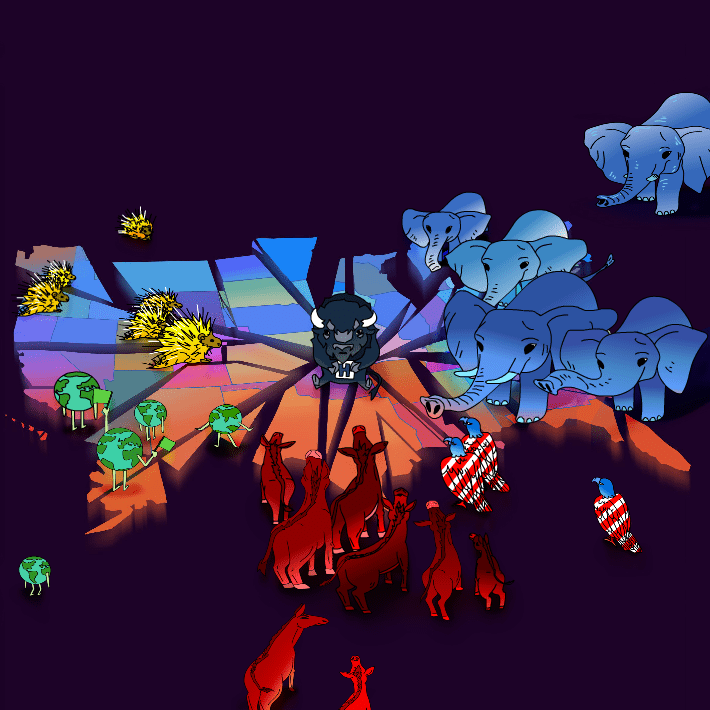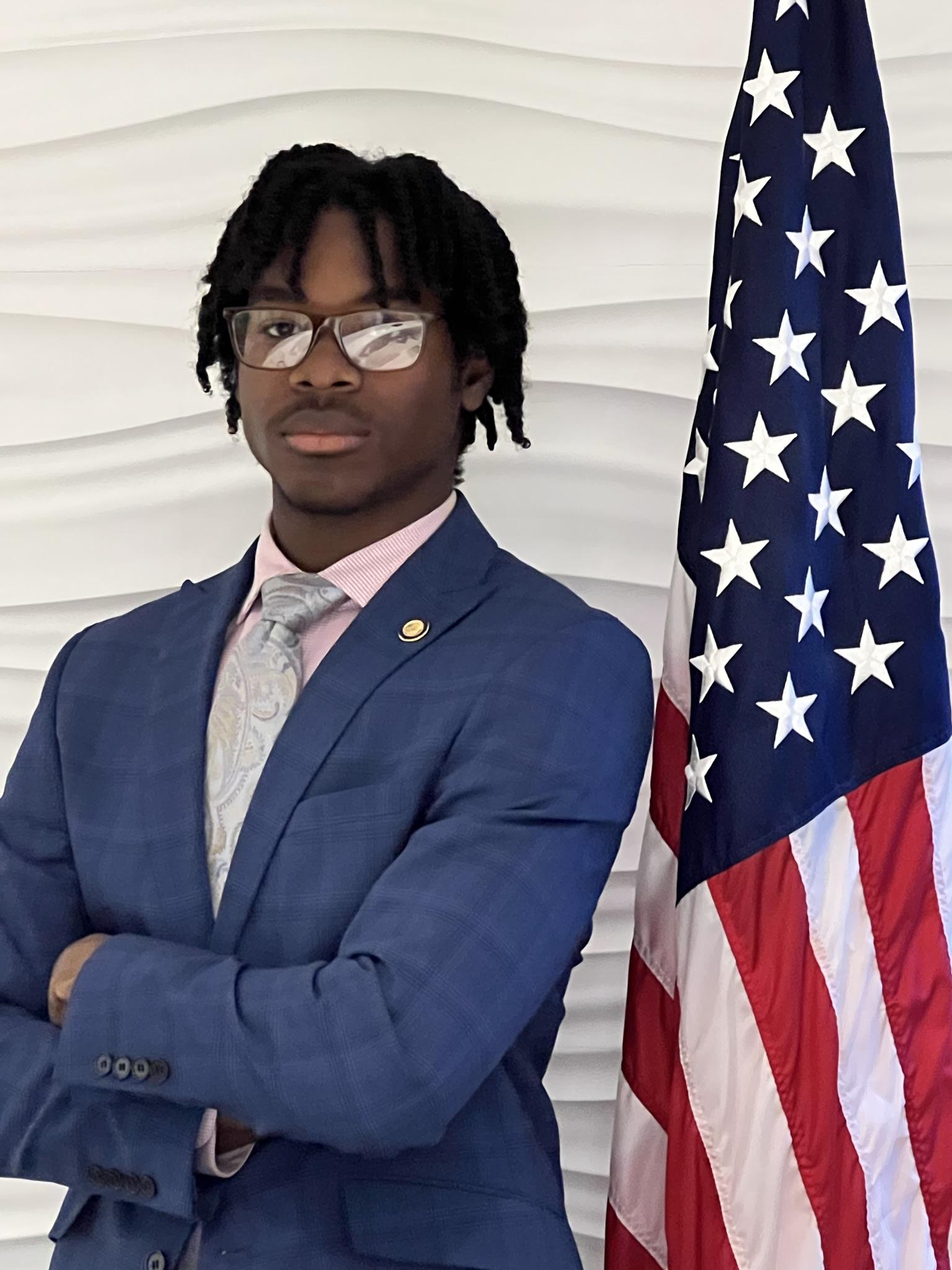
Ellison Richardson, a junior political science and Africana studies double major from Chicago, is excited about voting in his very first election while at Howard this Fall. “My most pressing issues are economic performance, healthcare, and protecting abortion rights. Across the board, the current sitting president is the best option we have in securing those as we know, they should be better,” Richardson says.
An active member in Howard’s political scene through curriculum and volunteering, Richardson says that most of his fellow Bisons’ concerns are what happens beyond this election.
“We’re trying to encourage our fellow peers to...mobilize as the constituency, as a necessary voice that needs to be heard in this country. It’s more than just showing up in November,” Richardson says. “There’s much more than needs to be done and if we could work with the administration in this, we could make great strides.”
These first-time voters are bearing witness to nonstop rent hikes, roll backs on progressive policies such as affirmative action, and gun violence that kills young Black people are higher rates than their counterparts of color. It’s a different kind of election season– a tense one of dissatisfaction, concern, and polarizing politics on the local, national, and world scales as hopelessness looms.
On a teetering democracy, the high stakes 2024 presidential election shifts American priorities to non-negotiables. Black voter’s identity and strategies to engage their communities are shifting too, especially as younger constituents exercise their right to vote for the first time during an exceptional time in American history. “Though we do have differences, I truly believe that we have what matters in common, which is our end goal: we want our people to prosper and the ability to have this nuances conversation on how to get there, I think Howard’s unmatched in that,” Richardson said. “We must maintain our revolutionary spirit because we deserve better. We can get better, and it can start with us.”
The Black Voter Bloc

In the 2020 presidential election, 92% of Black voters selected Joe Biden, while 8% voted for Donald Trump.
This election, there will be nearly 34.4 million eligible Black voters, or 14% of the total U.S. population, according to the Pew Research Center. Moreover, 41 million new voters are Gen Z, with 45% being voters of color, of which 5.7 million identify as Black. In the swing state of Georgia, Black citizens are one-third of the state’s total voters. Sixty percent of Black voters are under the age of 50. A 2022 Pew Research Center study determined that voters tend to stick with the party of their choice throughout their political voting careers. Older Black women are the most loyal group of voters to the Democratic party since the 1960s.
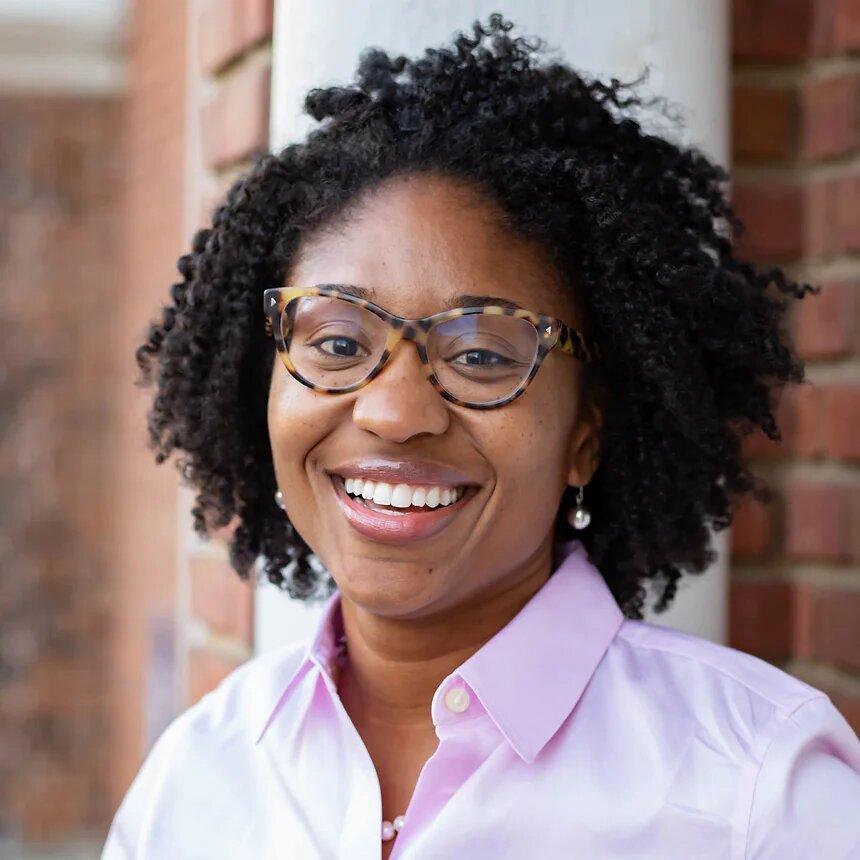
Keneshia N. Grant, PhD, a political science professor for nearly a decade at Howard, explained the voting patterns are an alignment of Black community values and party priorities.
“For the past 60, 65 years, the Democratic Party has espoused policies that more closely fit with what Black people’s understanding of ‘good’ or ‘positive’ or ‘freedom’ than the Republican Party does,’” Grant says, citing that the Black voter bloc were Republican before the Civil Rights Movement. “Black people are closely connected to the Democratic Party because historically it has been the party that has done the posturing necessary to demonstrate some interest in their issues.”
Even with the Black voter bloc’s loyalty, there is a generational difference in Black voter engagement and voting's role in finding solutions.
“For that cohort of people of, let’s say, 40 or older, there is very much a feeling of obligation, you hear the language that they use of ‘My ancestors fought and died for my right to vote,’” Grant says.
“I don’t hear that language from younger people though, but they seem to be worried about the future. I hear them talking about participation and ‘I’m going to participate because I want the future to be different and I don’t trust y’all to create a future that’s safe for me to live in,’” she notes. From inflation and rollbacks on issues such as abortion and affirmative action, the younger voting bloc want to see progress that will directly impact their lives.
“The mess frustrates them,” she says. “They express frustration when the idea of ‘Old people won’t get out of the way.’ In terms of the older generation of people, I think they are primarily concerned about harm reduction.”
Howard’s Political Activism
Howard University is a hallmark presence in American politics, as it serves as a trusted source of political thought in Black communities.
Political science professor Keneisha Grant, PhD, says universities are political pundits too. Appearing at Howard is a great indicator of speaking directly to the greater Black community. She cited the visit of Vice President Kamala Harris (BA ’86) in the Fall 2023 to address abortion rights issues.
“We could be telling the story of how she chose this space for what it meant to the broader public,” Grant says. “When you say you’re doing something at Howard, it sends a message to the broader Black community about [the event’s] legitimacy.
The election has taken shape in its most traditional forms on campus; Black Girls Vote’s Howard chapter is hosting voter registration drives and the Cathy Hughes School of Communications requires students to interact with elections close-up through on-the-street interviews and reporting throughout the D.C. metropolitan area.
“The goal of our organization is to foster a community of civic engagement that adheres to Howard’s model of truth and service in the legacy of those that came before us,” says Julianna Boye, a recent graduate and president of Howard Democrats. The group operates through a combination of informative events, workshops, and seminars. Boye’s goal, through these events, is to ensure students are well-versed in democratic ideals.
Boye expressed a yearning for diverse ideologies on The Yard as the Black community’s democratic alignment bears scarce fruit amongst the political spectrum. “There aren’t too many groups on campus with opposing ideology,” Boye says, noting that the College Republicans chapter at Howard is inactive.
During a recent panel discussion during Howard's Research Month, political science professor Ravi Perry discussed strategies Howard can implement to ensure civic engagement across the University.
“I spoke with President Vinson about...tracking all of our faculty, staff and student’s [civic] participation, whether they reside or engage, to ensure they do,” Perry says. “Whether they live in Trinidad, South Africa, or Compton, are you participating in those processes, and can we do a better job at tracking it? Just so we can showcase Black municipals around the globe.”
Howard has also taken polling into its own hands, making sure the Black opinion is accurately accounted for. Through the Howard Initiative on Public Opinion (HIPO), Black voters are asked questions about their position on a number of issues and who they would vote for. As many cold-called citizens might shy away from pollsters, the Howard identifier helps lend legitimacy to the interviewer on the other end.
After careful curation of answers, Terri Adams, PhD, director of HIPO, says that student volunteers of the poll collected more data once they identified as Howard University. “So people do trust the name, so it’s just not only our credentials in what we bring to the table, but it’s also the Howard brand,” she says.
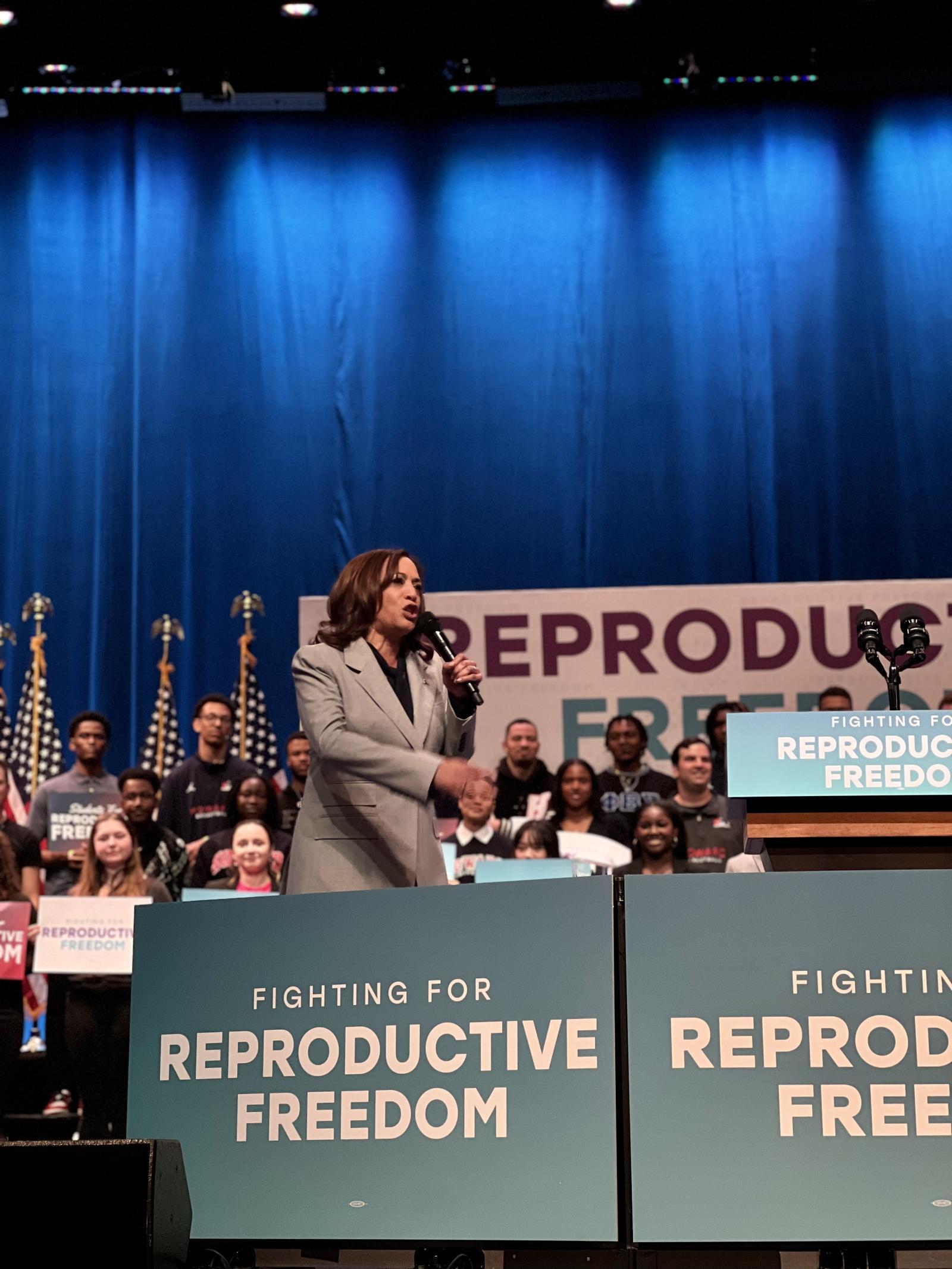
Rooting America’s Political Landscape in its Youth
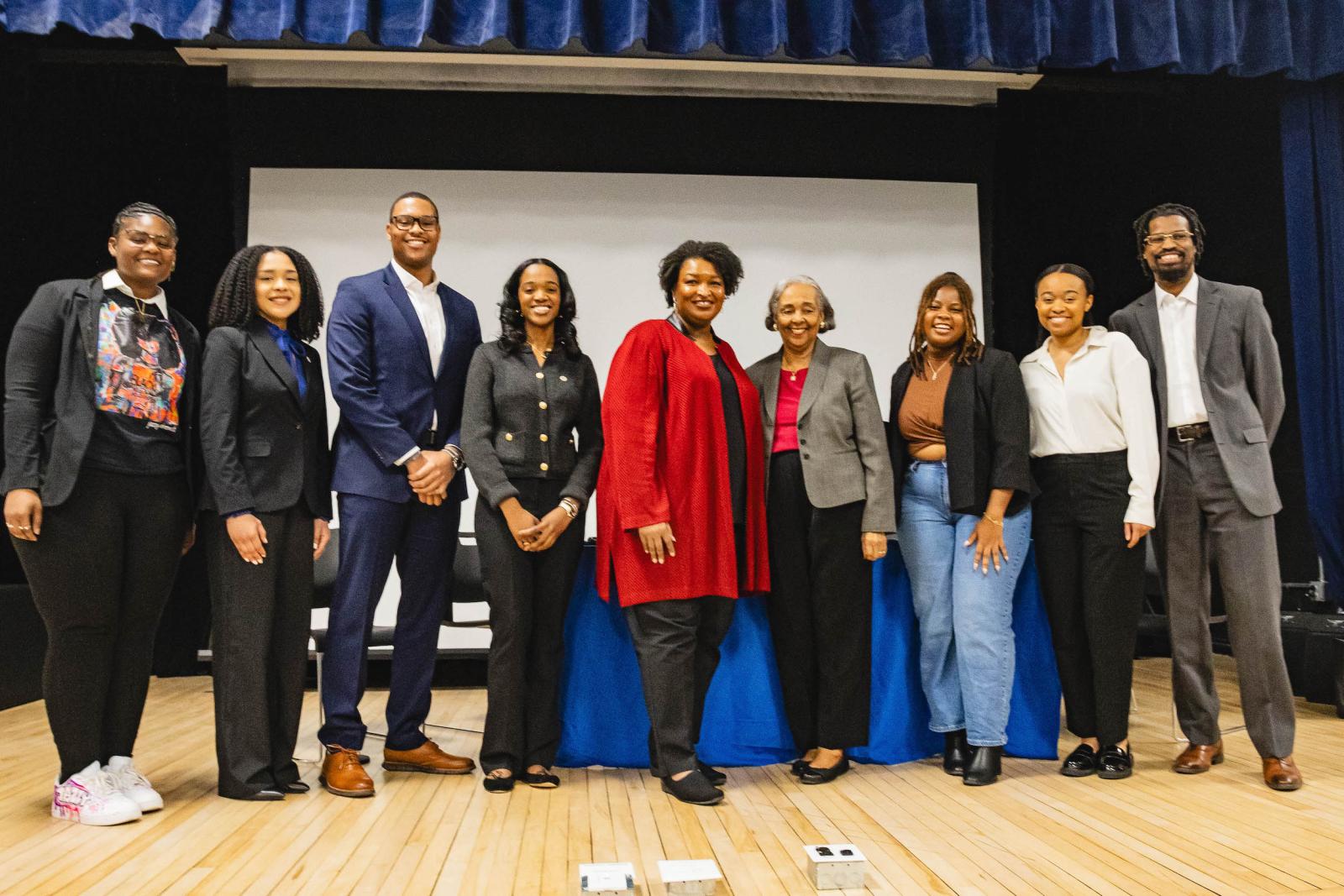
Right on Howard’s campus, voting rights activist Stacey Abrams and former Republican National Committee chair Michael Steele have made themselves available to young voters.
“I want to be a resource, and I want to be an inquisitor,” Abrams says. “Because of my experiences, because of the work that I’ve done across sectors, I have the opportunity and insight that can be helpful, but I also want to ask, what else can we do, what else can we know? What are we missing? And that’s where the students have been so incredibly important.”
Stacey Abrams is the Ronald Walters Chair for Black Race and Politics at Howard University. The position was named for the political science professor who spent 25 years teaching at Howard and chairing the department for nine. As an active political participant, Walters served as Jesse Jackson’s campaign manager during his run for president in 1984 and 1988. The Ronald W. Walters Leadership and Public Policy Center is led by Elsie L. Scott, PhD, the founding director.
So far, Abrams has three public events such as her question-and-answer session with the editorial masthead of The Hilltop. On April 17, Abrams invited Kemba Walden, the former principal deputy of the Office of the National Cyber Director, to discuss the nation’s heightened security and IT practices to minimize artificial intelligence and misinformation.
With her emphasis on voter engagement, particularly younger Americans, Abrams says ongoing politically engagement will be a turning point in practicing democracy. “There needs to be an active engagement of the needs of our communities, and those needs cut across education, economy and elections.”
“My mission is for students to understand that politics...is about what happens the very next day, and it’s not about who’s on the ballot, but the voter in the booth,” she says, noting that her role is to move past bipartisanship toward seeing elected officials fulfill their obligations to serve the people.
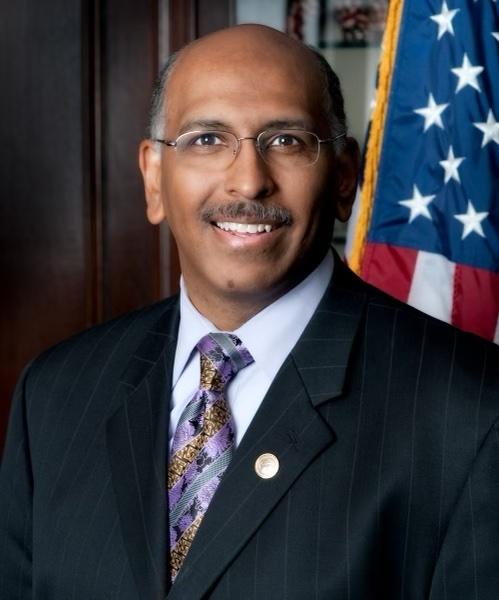
Michael Steele is this year’s Gwendolyn S. and Colbert I. King Endowed Chair in Public Policy. In addition to occupying the King chair, he is a political commentator and analyst for The Root and MSNBC, with a podcast about American politics too.
Steele’s trailblazing work in the Republican Party begins in 2003 when he became the first Black man to be elected as the lieutenant governor of Maryland. From 2009 to 2011, Steele also served as chair of the Republican National Committee. He’s invited many of his Republican affiliates with a goal of showcasing the political spectrum for America’s solutions. “What I’m trying to do is have rational conversations around issues of race, political identity, value systems, and politics,” he says.
“My goal was to listen to the students and hear from them what they’re experiencing in this turning point moment of our country.”
For Steele, most of his work is demystifying some of the Republican’s actions and election tactics as a party. “This campus has been a place where I could be challenged by students who asked “Why do you guys think that or feel this way? It’s been a very important learning lesson from me and certainly these folks that I brought on campus this year,” Steele says.
As the King Chair, Steele has invited Tara Setmayer of The Lincoln Project to sit on Steele’s "The Fake Consumerism of American Politics” panel on January 31, which discussed the role of artificial intelligence in the attack against American democracy.
“It has nothing to do with actual good governance or legislation, or the lives this impacts...it has everything to do with being able to use fear mongering tactics of otherism, of crime and chaos on the border for a political issue in an election year,” Setmayer says.
Gathering Black Voter Data

Housed in the Graduate School, the Howard Initiative on Public Opinion (HIPO) looks to reflect the Black voter bloc’s needs through a series of distinctive, culturally resonant questions unique to the African diaspora. “We have an interdisciplinary team of scholars, representing Afro-American Studies, Communication and Media Studies, Economics, English, Political Science, Psychology, and Religious Studies, says HIPO Director Terri Adams, PhD, of HIPO's multidisciplinary approach. “We have someone from the sociology and criminology department. We’re not just giving you data through one lens when framing these questions.”
Because of the Black voter bloc’s 60-year loyalty with Democrats, pollsters engaged with Black voters in monolithic methodology, overlooking the diversity of wants, needs, and solutions for Black communities. “We want to drill down to really get that authentic feel in the responses,” Terri Davis, PhD, HIPO's postdoctoral fellow says. “It highlights that we have a lot to give, we are powerful voting bloc and I think we have proven there’s a gap in identifying our voices.”
In its National Black Voter Poll, HIPO gauges how Black voter identities in religion, region of residence, economic class, and education levels inform their voting preferences.
“We’re thinking about the different types of Black communities and the people with those demographics help us in that regard,” says HIPO member and Graduate School Dean Dana A. Williams, PhD. “We understand the different nuances associated with people from the different parts of the African diaspora and we know how to ask questions to uncover authentic opinions.”
57%
of Black Voters say "economy and jobs" are top voting priorities in the 2024 presidential election. (Source: Howard Initiative on Public Opinion)
-
39% of Black voters label racial justice as second priority. (Source: Howard Initiative on Public Opinion)
In HIPO’s 2024 Black Voters’ Poll Report, pollsters determined that racial justice, democracy, the health of the American economy, and affordable housing and healthcare are top-of-the-line concerns for Black voters. For Biden and Trump as party candidates, pollsters found that Biden’s age is the biggest concern whereas Republicans questioned Trump’s ethics and morals.
Only 4% of Democrats plan to vote for Trump while 6% of Republicans will cross the aisle for Biden. At 76%, Protestant Christians are the religious group to vote for Biden. Of the poll, Black women were 65% of the sampled answers and over a third were over the age of 40.
Want to be a catalyst for change? Let your voices be heard by joining one of our research panels. We are seeking insightful voices for future research on a range of topics important to Black communities everywhere. We invite participation from all ages and demographics. Help shape the future by offering your thoughts, opinions, and experiences. To join, click on here. Someone from our team will be in touch regarding the next steps. - Howard University Initiative on Public Opinion.
Howard is a critical pathway of education into fields where African Americans are not present.”
Research Month included data election too, as the Howard University Department of Political Science’s “Making Sense of the 2024 Election” seminar was led by department professors Ayana Best, PhD, Marcus Board, PhD, and Ravi Perry, PhD on April 19.
“I think we need to inform the regular, everyday voter that these decisions really matter,” Best says. “Donald Trump appointed two people on the Supreme Court that repealed Roe v. Wade, he put two people on there that got rid of quality education for people of color. We need to consider those things.” Scott was also part of this conversation, delivering data updates from her additional roles at ESSENCE’s Black Women’s Roundtable election organization. “In the ESSENCE poll we asked the issues that are going to drive women to the polls, when they plan to vote, and who they plan to vote for,” Scott says. “Some of the issues we find this year is that women are concerns that the economy conditions are worsening, many of them are saying their wages are falling off so this could have impact of their desire to vote. We try to push the issue of local election, state elections because if people only sit back and wait to vote in general elections for the president, they're missing out on a plot of politicians that would like to make their lives better.”
Howard University Office of Research Vice President Bruce Jones, Ph.D., attended the panel and spoke to the importance of Howard’s inclusion of political data. "Too often, research does not include us as sample populations, so Howard plays a critical role in mitigating those effects,” he says.
“It informs decision making within the political arena so that people who make those decisions are not just simply shooting from the hip,” Jones says. “The policy decision they make are research driven and often it makes great policy. Howard is a critical pathway of education into fields where African Americans are not present.”
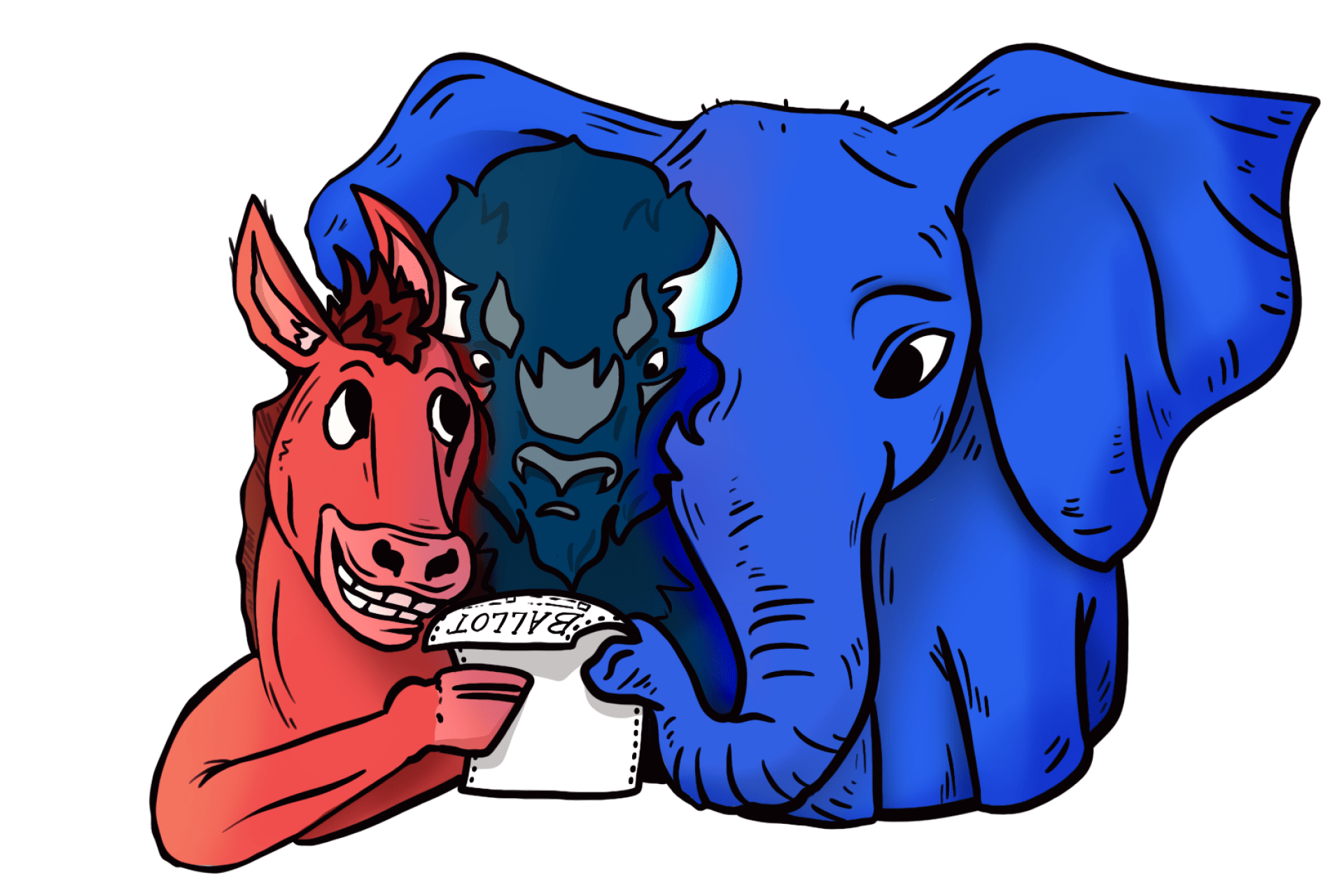
(Source: Michelle Moore)
The Black Voter Bloc and the Third Party’s Potential
On April 10, as an independent candidate, political activist Cornel West announced that Melina Abdullah (BA ’94), PhD, would serve as his running mate for the 2024 presidential election. They join four other candidates (as of press time): incumbent President Joe Biden and Vice President Harris; Republican nominee, the 45th President Donald Trump; Green party candidate Jill Stein, and independent Robert F. Kennedy.
West chose Abdullah as a running mate for her role as director of Black Lives Matter organization, overseeing its 33 nationwide chapters.
For Abdullah, her campaign with West marks a new chapter in American elections and politics at large as third- or multi-party presence in elections reflects a true sense of democracy.
“Democracy means ruled by the people and it means that we have to have choices,” Abdullah says. “We want to build in a way that’s truly democratic through new parties and new candidates.”
West believes the third party possess an infinite potential for the Black community, a chance to divest from the Democrats and Republicans. “Unfortunately, we’re living in a time where there’s overwhelming corruption,” West says.
He continued: “There’s just so many issues that the [current] political system does not allow us to have a serious conversation about engaging in direct action. We’ve got to find some alternative if we’re going to be able to speak to the issues of poverty, homelessness, housing insecurity, and our ecological crisis of greed with fossil fuel companies.”
The West – Abdullah ticket is under the Justice for All party. The party was launched through West’s announcement for president.
“This [campaign] is a tremendous opportunity for the movement, that we get to articulate what we mean when we say defund the police, by abolition,” Abdullah says. “I envision this as an opportunity to speak and use this platform for the benefit of the movement. We have an opportunity to build on the momentum of the movement.”
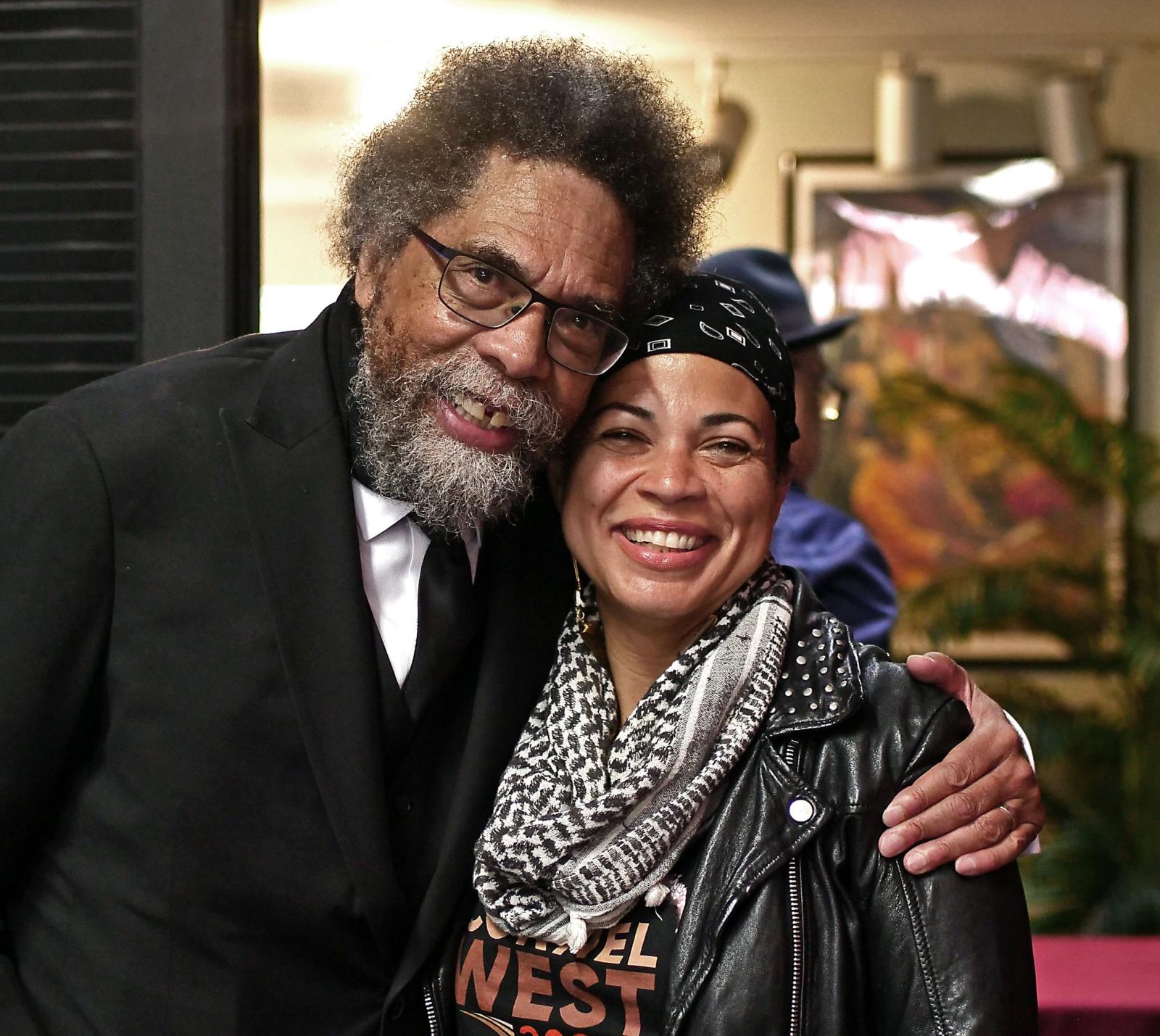
Seeking a Political Identity
The panel also discussed controversial aspects of the Black political experience, like assessing whether the two-party system of the Republican and Democratic party as a sustainable system.
The “lesser of two evils” theory proposes that Americans must participant in civic engagement despite not having adequate candidates to cast a vote that reflect their truest needs and concerns for a viable American future.
“The opinions people have about the lesser of two evils argument is an opinion based in their own ignorance,” Perry says. “Most people who think the parties are lesser of two evils are people who don’t know party history at all. The irony in that is the fact we have an opinion, and aren’t thrown in jail for that opinion, is actually because of that same [two-party] system.”
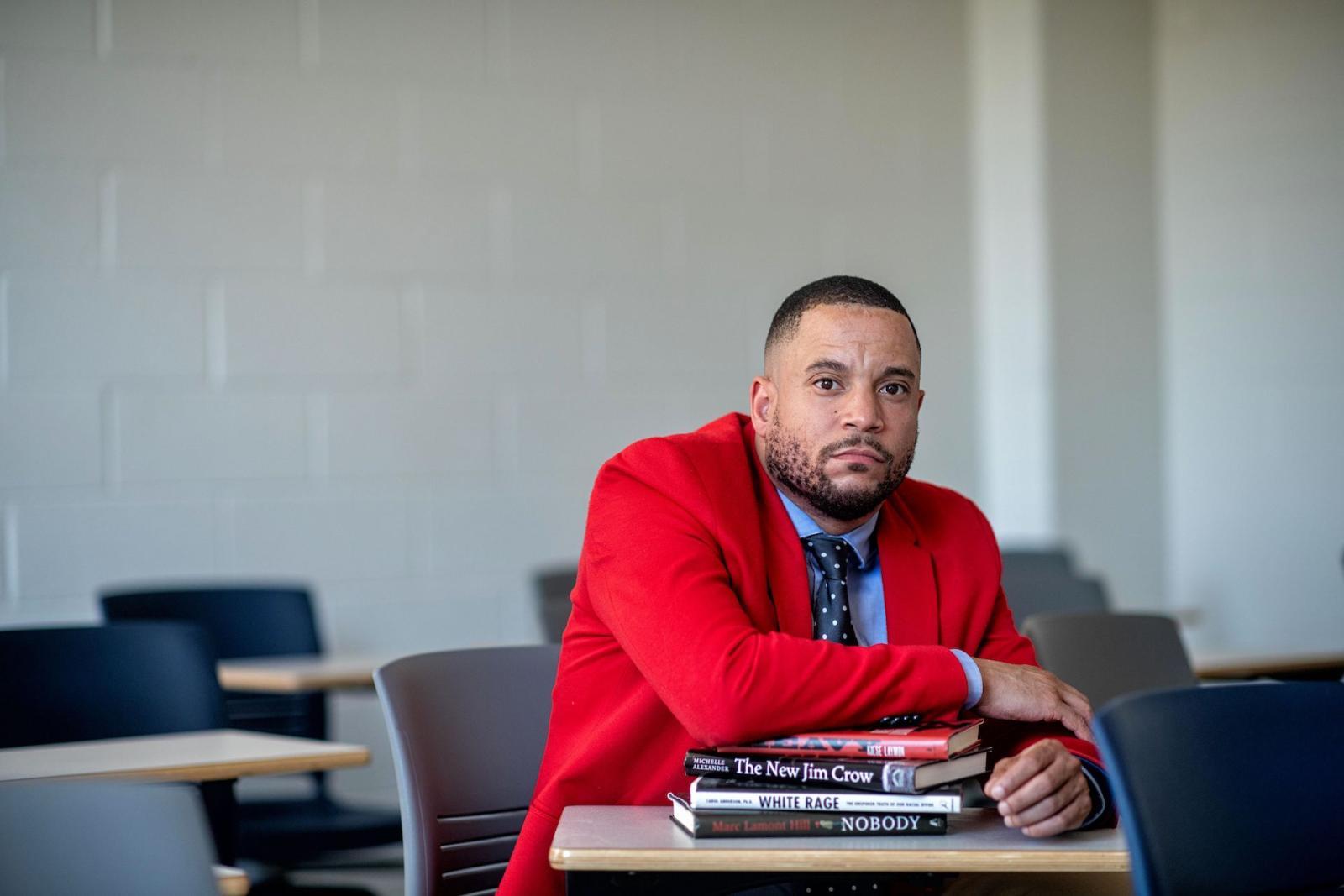
Richardson’s essay, “The Bitter Necessity of Voting for the Lesser Evil” was a winner in an essay contest held by the Ron Walters Center and political science department. In his essay, he debates third-party validity through his opinions and research.
“In the historical context, third party candidates have only won a total of 186 electoral votes since 1912, which includes incumbent Theodore Roosevelt who only earned 88 electoral votes,” Richardson wrote.
In a perfect world, Richardson believes rank-choice voting would be the best way to capture the millions of Americans true voting hopes. “And also rank choice voting beyond a two-party system as well, you can still vote who you want for, and ensure every candidate has a fair chance of winning,” he says.
Richardson says third party’s presence is possible, however today’s solution should be about working across the aisle to lay a foundation for diverse political opinions to comfortably exist in American politics.
Richardson thinks that voting is no longer just a “bitter necessity,” but the beginning.
“It starts with your local politicians,” Richardson says. “If you get those who are less known to be known, or seems more political or progressive, then you can begin to lay a foundation that is a necessary for progressivism, pragmatical radicalism, then you continue to elevate those people where they can have the greatest affect across the nation, and then we move away from a two-party system.”
Howard University and The Hill hosted a special event designed to raise awareness of the pivotal role Black women play in American politics. The event will be held at WHUT, was hosted by Cheyanne M. Daniels, race and politics reporter for THE HILL with conversations with prominent women political figures such as Whitley Yates, Congresswoman Cori Bush and Stacey Abrams. Those interested can watch the archived event on YouTube here.
Article ID: 2131




